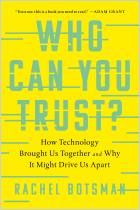
2018's Developments for China's Social Credit System
An Overview of the Progress of China’s Citizen Scoring Program
Recommendation
In the “Nosedive” episode of the popular surreal sci-fi TV series Black Mirror, people receive individual ratings based on background, social standing and behavior that affects whether they are allowed to take out a loan or rent a car, and so on. That’s what China seeks to accomplish by developing a national social credit system. The government aims to promote trust and integrity within society and to correct undesirable behavior in individuals as well as enterprises, such as smoking in nondesignated areas, violating traffic rules, committing financial fraud or producing fake goods. Western media criticize the social credit system as a monitoring tool that could feature in such dystopian novels as George Orwell’s 1984. Chinese news about the social ranking system has been scarce, and the public rarely discusses it openly. Most Chinese articles focus on the technical features of the private credit rating tools that are working with the government on building the national social credit system, for example Alibaba’s Sesame Credit and Tencent’s credit system. Those articles approach the topic from a business rather than social perspective. In this article, reporters An Shuyi, Zhu Siyun and Yang Jiajia from Xinhua News sum up what experts from government, academia, finance and credit rating agencies believe to be in store for the social credit system in 2018. Although the article strikes an official, politically correct tone, getAbstract recommends it to people who are interested in China’s controversial social credit system and in its different portrayal in the West and in China.
Summary
About the Authors
An Shuyi, Zhu Siyun and Yang Jiajia are reporters at Xinhua, the official press agency of the People’s Republic of China.






















Comment on this summary or Start Discussion